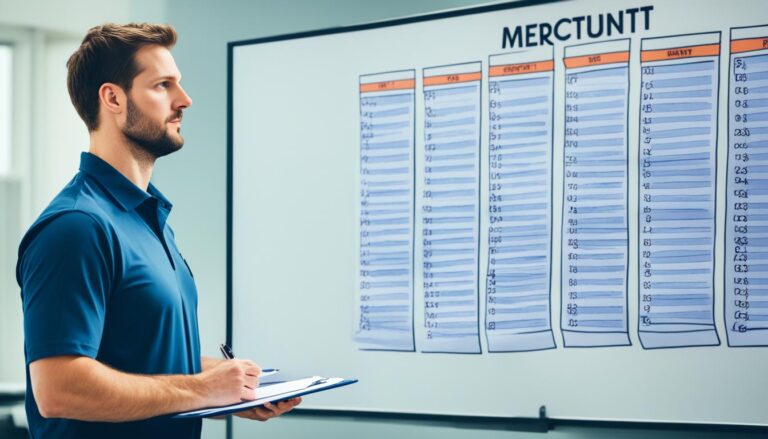Ace Your Interview with Time Management Questions

“Time isn’t the main thing, it’s the only thing.” – Miles Davis
Time management is a skill that can make or break your success in both personal and professional settings. As you prepare for an upcoming interview, it is important to recognize the significance of time management and how it can set you apart from other candidates. Employers value individuals who can effectively prioritize tasks, meet deadlines, and stay organized in a fast-paced environment.
In this article, we will guide you through the process of acing your interview with time management questions. From the best strategies to common interview questions, we will equip you with the knowledge and confidence you need to showcase your time management skills and secure the job of your dreams.
Importance of Time Management in Interviews
Time management is a crucial skill that employers value in candidates. It showcases your ability to prioritize tasks, meet deadlines, and stay organized. During interviews, employers often ask questions related to time management to assess your capability in handling workloads and staying productive. By effectively showcasing your time management skills and discussing specific examples of how you have managed your time in the past, you can leave a lasting impression on your interviewer and demonstrate that you are well-equipped to handle the demands of the job.
Effective time management is essential for several reasons:
- Meeting deadlines: Time management enables you to plan ahead, allocate appropriate time for each task, and ensure that you meet deadlines consistently.
- Prioritizing tasks: With effective time management skills, you can prioritize tasks based on their importance and urgency, allowing you to focus on high-priority activities and maximize productivity.
- Maintaining organization: Time management helps you stay organized by setting clear goals, creating task lists, and utilizing tools to track and manage your progress.
By discussing these benefits and providing specific examples of how you have effectively managed your time in previous roles or projects, you can impress your interviewer and show that you are a reliable and efficient professional.
To further emphasize the importance of time management in interviews, here are some common time management interview questions that you may encounter:
- Can you describe a situation where you had to effectively manage your time to meet a tight deadline?
- How do you prioritize your tasks and ensure that you accomplish them on time?
- Can you provide an example of a time when you had to delegate tasks to meet a project deadline?
- How do you handle interruptions and unexpected changes to your schedule?
By preparing well-thought-out responses to these questions and incorporating specific examples of your time management skills and strategies, you can effectively showcase your capabilities and increase your chances of impressing your interviewer.
When discussing your time management skills during an interview, remember to:
- Be specific: Provide concrete examples that highlight your time management skills and achievements. Use the STAR method (Situation, Task, Action, Result) to structure your answers.
- Highlight tools and strategies: Discuss any tools, techniques, or strategies you use to prioritize tasks, stay organized, and meet deadlines.
- Link to company goals: Connect your time management abilities to the specific needs and goals of the company, demonstrating your alignment with their values and expectations.
By following these tips and effectively communicating your time management skills and experiences, you can make a strong impression during your interview and increase your chances of securing the job.
Tips for Answering Time Management Interview Questions
When preparing to answer time management interview questions, it is important to keep a few tips in mind. First, be sure to provide specific examples that showcase your time management skills and achievements. Use the STAR method (Situation, Task, Action, Result) to structure your answers and provide a clear and concise explanation of how you effectively managed your time. Additionally, discuss any tools or strategies you use to prioritize tasks, stay organized, and meet deadlines. By demonstrating your ability to effectively manage your time in a professional setting, you can impress your interviewer and increase your chances of landing the job.
Here are some key tips to keep in mind when answering time management interview questions:
- Provide specific examples: Instead of giving general answers, provide concrete examples from your past experiences where you successfully managed your time.
- Use the STAR method: Structure your answers using the STAR method to provide a clear and structured explanation of how you handled time management challenges.
- Showcase your strategies and tools: Discuss any specific strategies or tools you use to prioritize tasks, stay organized, and meet deadlines.
- Highlight your achievements: Share any achievements that demonstrate your effective time management skills, such as completing projects ahead of schedule or exceeding expectations.
By following these tips, you can confidently answer time management interview questions and showcase your ability to manage your time effectively in a professional setting.

Common Time Management Interview Questions
During your job interview, you may come across several common time management interview questions. These questions serve as an opportunity for employers to assess your ability to effectively manage your time and handle challenging situations in the workplace. By preparing thoughtful answers and providing specific examples from your past experiences, you can demonstrate your time management skills and increase your chances of impressing the interviewer.
- How do you prioritize your tasks and manage your time effectively?
- How do you handle multiple deadlines and ensure that you meet them?
- Can you provide an example of a time when you had to make adjustments to your schedule to meet unexpected demands?
- How do you handle interruptions and distractions during work?
- Describe a situation where you had to delegate tasks to others to meet a deadline.
This question aims to understand your approach to task prioritization and time management. Be sure to discuss your strategy for determining the importance and urgency of tasks, as well as any techniques or tools you use to stay organized and productive.
Managing multiple deadlines requires strong time management skills. Provide examples of how you have effectively planned and organized your work to meet simultaneous deadlines. Discuss any prioritization methods, delegation techniques, or time-tracking tools you utilize to ensure on-time delivery.
Adaptability and flexibility are crucial in the workplace. Share a specific scenario where you had to rearrange your schedule to accommodate unforeseen tasks or urgent requests. Explain how you reorganized your priorities, managed the new demands, and ensured that all essential tasks and deadlines were met.
Distractions can significantly impact productivity. Outline strategies you use to minimize disruptions and maintain focus. This may include techniques such as time blocking, setting boundaries, or implementing productivity tools to stay on track.
Evidence of effective delegation demonstrates your ability to collaborate and utilize resources efficiently. Share a situation where you delegated tasks to a team member or colleague to meet a tight deadline. Discuss how you assigned responsibilities, communicated effectively, and monitored progress to ensure successful completion.
By tackling these common time management interview questions with well-prepared answers and real-life examples, you can showcase your strong time management skills, problem-solving abilities, and adaptability. Remember to emphasize the positive outcomes and lessons learned from each experience to leave a lasting impression on the interviewer.
Conclusion
Mastering time management interview questions is essential for impressing your future employer and showcasing your ability to effectively manage your time in the workplace. By preparing and practicing your answers to these questions, you can demonstrate your professionalism, efficiency, and strong time management skills.
During the interview, be sure to discuss specific examples that highlight your strategies and tools for time management. Use the STAR method to provide a clear and concise explanation of how you have successfully managed your time in the past.
Remember to stay calm, focused, and confident during your interview. And after the interview, follow up with a thank-you email to reinforce your interest in the position and leave a lasting impression on the interviewer.
By implementing these tips and strategies, you can ace your interview and position yourself as a top candidate with excellent time management skills.






